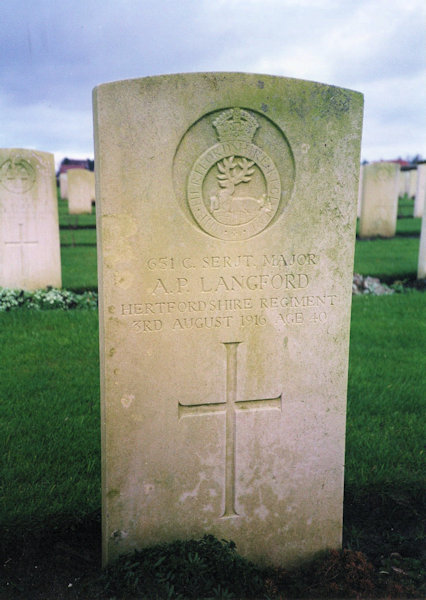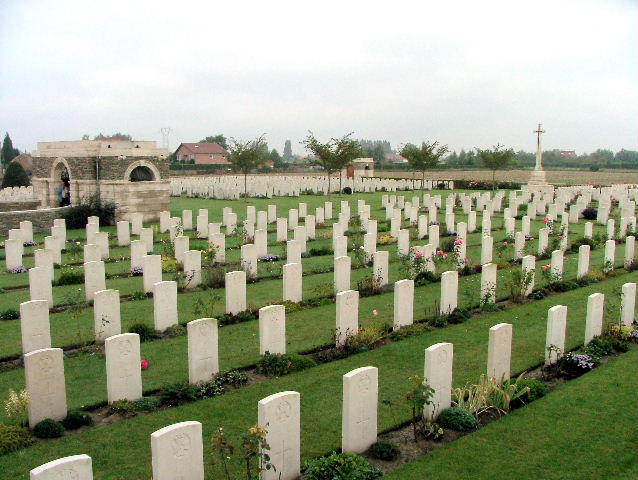Name
Arthur Percival Langford
1876
Conflict
First World War
Date of Death / Age
03/08/1916
40
Rank, Service Number & Service Details
Company Serjeant Major
651
Hertfordshire Regiment
4th Coy. 1st Bn.
Awards: Service Medals/Honour Awards
1914 (Mons) Star, British War and Victory Medals
Cemetery/Memorial: Name/Reference/Country
BROWN'S ROAD MILITARY CEMETERY, FESTUBERT
II. A. 14.
France
Headstone Inscription
Not Researched
UK & Other Memorials
St Mary's Church Roll of Honour (Book), Hitchin, 4 Coy' Hertfordshire Reg' Territorials Memorial, Hitchin, Hertfordshire Regimental Memorial, All Saints Church, Hertford
Pre War
Wartime Service
As a Territorial and mobilized at the declaration of war its ranks were not required to serve abroad, however many volunteered to do so, as Arthur did on 31 August 1914. The Hertfordshires were one the first Territorial battalions to be sent – they embarked from Southampton on 5 November 1914. Arthur as Sergeant 651 ‘G’ Company. Apparently he was rejected for fighting duties due to a sight defect but was permitted to stay with the Battalion assisting the medical parties.
During November 1914 he wrote home from the Front: “we have had rather a rough time as we were only a week before got into the firing line. We have been most fortunate as we were shelled on the March and every day and night for over 10 days. The Jack Johnson's are rotten --- they make an immense hole and burst like 3 shows, covering a distance of over 50 yards.
I have had quite an experience with the womb did. One occasion we had to carry them over 2 miles to the field ambulance, with bullets flying around all the time. We could only move the womb did after dark, and as the trees had been blown up by shell fire it was very difficult to move them without unduly shaking them up. On some of our marches we had to plough through mud and water up to our knees. Then the cold weather set in --- rain, snow and sharp frost."
He wrote further on November 30th: describing the fighting he said: “the 1st Herts were within 170 yards of the German trenches when we were in the woods”, and he added we usually have “I have a lot to do with the wounded. All in the battalion who have been injured have passed through my hands. We have not been all the time in the rear, but had to go up to the trenches. The sights are rather blood curdling, but I am getting hardened. The men are very patient when wounded. Sometimes they have to lay in the trenches all day before they can be moved . We dress their wounds with the first field dressing, and when they arrive at the dressing stations the doctor takes them in hand. If they are fairly comfortable the bandages are not removed until they arrive at the Base Hospital where they receive the best attention.”
Company Sergeant A H Hardy was sent to hospital on Christmas Day 1914 and Arthur was promoted to take his place as Acting Company Sergeant on the same day. The on 19 January 1915 his promotion was confirmed and then on the 28th he then became Warrant Officer Class II.
He was around for the 1st Battle of Ypres. In May 1915 he was helping at one of the Dressing Stations and said that the arrangements for getting the wounded away were excellent and that, after having their wounds dressed, they were off to a General Hospital by motor car within ten minutes. He said that the wounded were cheerful and asked for a drink and a cigarette.
Arthur was given leave to England between 21 July 1915 to 27 July 1915 and was wounded ‘At Duty’ in the vicinity of Vermelles, on 18 November 1915, where the Battalion were in the trenches. It is not clear how badly he was injured or how long recovery took. His service records that he was re-engaged in the Field sometime in March 1916 and a newspaper reported that he had volunteered for ‘active’ service in April (1916) – this was when his engagement had expired, and he signed on again on 21 March 1916,
Unusually, he was granted leave to England again, between 7 April 1916 to 6 April 1916.
He received a bounty of £15 on 19 September 1916 – it had been decided that a bounty of would be paid to any warrant officer (class ii), who was serving, if they agreed to continue their service for the duration of the war upon completion of their present engagement.
The Hertfordshires became known as the ‘Herts Guards’ as they fought with distinction in the Guards Division for a considerable period, but at the time of Arthur's death they were part of the 118th Brigade of the 39th Division. He was made Company Serjeant Major of ‘G’ (Hitchin) and ‘E’ (Royston) Companies. He was killed in action and his Commanding Officer wrote to his brother that he had been killed by shellfire and had been buried in a British cemetery that same evening. The Hertfordshires were not involved in any major engagement at the date of his death.
There is also an entry in the War Diary dated 7 August 1916 which states “The Bn was relieved by the 1/1st Cambs Regt. and took over keeps and billets in the village line. During this tour in the trenches the Bn was unfortunate in losing CSM Langford [651 Arthur P. LANGFORD] who was killed by a shell.”
On the 5th August 1917 a bronze tablet 18" x 8" was dedicated in St. Mary's Church, Hitchin near the south door "To the Glory of God and to the memory of Arthur Percival Langford C.S.M. 1st Herts Regiment who was killed in action near Festubert in France on the 3rd August 1916 aged 40. This tablet was erected by the officers, non-commissioned officers and men of No. 4 Company. He was 2nd son of William Eve Langford of Hitchin and a sidesman of this Church".
Additional Information
After his death £77 7s 7d was authorised to go to Arthur’s sole executor, his brother William Francis (a solicitor) on 13 October 1916, then another £4 4s 6d on 22 February 1917. Later, a war gratuity of £16 was authorised to be paid to him on 26 November 1919.
Probate was granted on 30 August 1916 with the value of his effect given as £381 9s.
His pension cards record Mrs Francis Elizabeth Langford, his mother, as his dependant, living at 69 Tilehouse Street, Hitchin. It was noted that she was ‘wholly impaired’ and awarded a pension of 12s a week from 15 May 1917.
The Army instructed Arthur’s personal property to be sent his father, first at The Old Free School House, Hitchin at on 13 October and Then, presumably more items, to Heathfield, 34 Bedford Road, Hitchin on 26 November 1919
Acknowledgments
Jonty Wild



